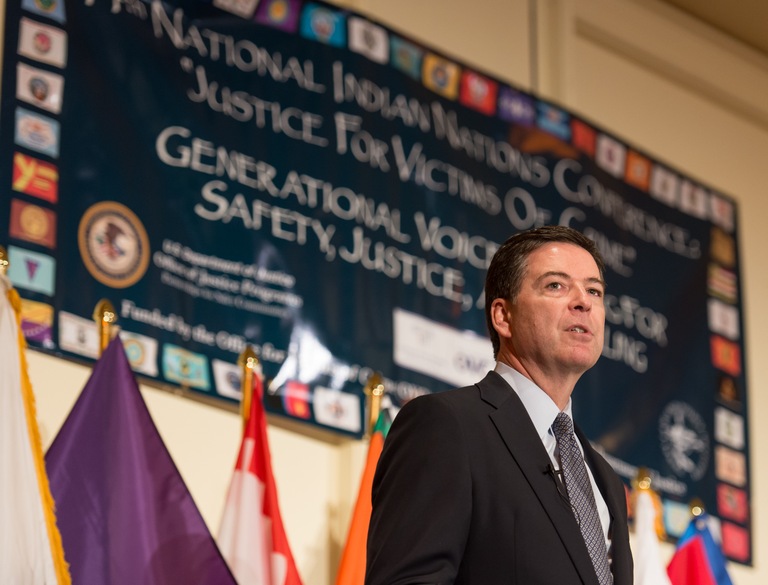A Commitment to Indian Country
Director Pledges Continued Support for Crime Victims
At the 14th National Indian Nations Conference, which convened today on the reservation of the Agua Caliente Band of Cahuilla Indians in California, FBI Director James Comey pledged the Bureau’s “unshakeable” commitment to tribal nations.
The Bureau has unique and important responsibilities in Indian Country, Comey told more than 1,000 conference attendees. Investigating crimes and assisting victims there, he said, “will be a priority of the FBI under my stewardship.”
The Indian Nations conference, sponsored by the Department of Justice’s Office for Victims of Crime and coordinated by the Tribal Law and Policy Institute, brings together Native Americans and a range of community and government agencies and service providers to share knowledge and develop programs to help those impacted by violence on tribal lands.
Comey noted that his interest in the FBI’s Indian Country work is driven by his responsibilities as Director, but also by something more—his family. Last summer, his two youngest daughters went on a mission trip to a reservation and came home, he said, “with their eyes wide open about the challenges on the reservation. They said, ‘Dad, you’ve got to do something, you’ve got to do more.’”
The FBI has investigative responsibility for 212 Indian reservations nationwide, and about 115 special agents work in our Indian Country program. Additionally, 41 victim specialists from our Office for Victim Assistance serve Native American crime victims. The Director acknowledged that those numbers should be higher.
To begin to address staffing and resource needs, Comey said, he has asked the Indian Country Crimes Unit and Office for Victim Assistance at FBI Headquarters to submit proposals detailing the need for increased staff, specialized training, and additional equipment. “I can’t do everything,” he explained, “but I know that I can do better.”
Comey highlighted several areas in which the Bureau provides valuable resources to tribal nations:
- Training. Beyond the many training opportunities the FBI provides to tribal law enforcement, the Bureau is developing a new, three-week school—in partnership with the Bureau of Indian Affairs (BIA)—to equip new FBI and BIA agents, along with tribal law enforcement officers, with cutting-edge training on investigating Indian Country crimes.
- Partnerships. “One of our most important joint efforts is the Safe Trails Task Forces,” Comey said, “the first of which originated 20 years ago.” Currently, there are 14 Bureau-led Safe Trails Task Forces nationwide, bringing together federal, state, local, and tribal resources to combat violent crime, drugs, and corruption in Indian Country.
- Victim assistance. “Much of our work in Native American communities involves the most heartbreaking kinds of crimes—the homicides and the violent assaults and the rapes, and especially the abuse directed at kids,” said Comey. FBI victim specialists provide on-scene crisis intervention and help victims and their families navigate the criminal justice process. “The work of our victim specialists is so important to the FBI that we made sure many of them were here today to meet with their counterparts in the BIA,” explained Comey, “so they can talk with you about how to get better at their work.”
“The essence of our job in the FBI,” Comey added, “is to ensure that justice is done for everyone in America—every man, woman, and child living in any part of this great land—including American Indian and Native Alaskan communities.”
Understanding Victims
A major theme of the 14th National Indian Nations Conference is “justice for victims of crime.”
 Speaking to the mostly Native American attendees—many of whom were victims of crime—Director James Comey explained, “I know how crime victims feel, because I’ve lived through that experience myself.”
Speaking to the mostly Native American attendees—many of whom were victims of crime—Director James Comey explained, “I know how crime victims feel, because I’ve lived through that experience myself.”
When he was a high school senior in New Jersey nearly four decades ago, Comey was home alone with his younger brother one night when an armed man kicked in the front door and held them captive. “It was a horrific experience for anybody,” Comey said, “but especially for a young person to be threatened with a gun, and to believe this man was going to execute me and my brother.”
As a result of that experience, he said, “It gave me a sense of what victims feel. Even the notion that no one was physically harmed doesn’t mean no one was harmed—because I thought about that guy every single night for five years.” That experience, he added, “made me a better person. I know it made me a better prosecutor and investigator.”
Videos: Perspectives on Challenges in Indian Country



